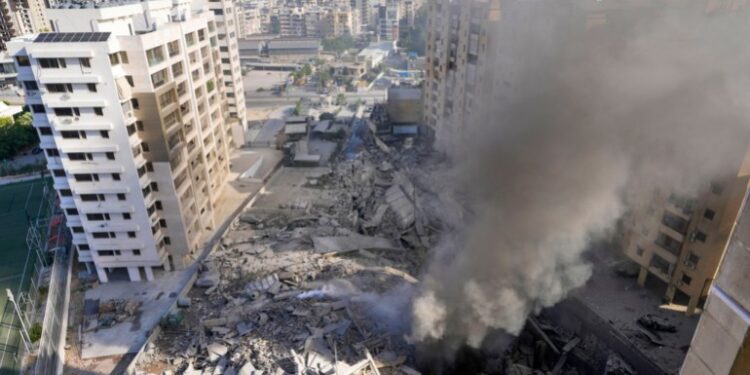Israel’s military has killed at least six people in an air attack on central Beirut after suffering losses in fighting with Hezbollah in southern Lebanon.
The attack on Lebanon’s capital occurred overnight, hitting an apartment building in the residential district of Bashoura, not far from the parliament. Lebanese health officials said a further seven people were wounded.
The attack is the second one on the Lebanese capital this week, with Hezbollah-aligned al-Manar TV station saying the apartment building was linked to the armed group’s health unit.
Reporting from the scene, Al Jazeera’s Laura Khan said the sound of the explosion “reverberated around the buildings and shocked everyone nearby”.
Meanwhile, missiles also hit Beirut’s southern suburb of Dahiyeh, a densely packed residential area that is also a Hezbollah stronghold and where the group’s leader Hassan Nasrallah was killed last week.
The elimination of Nasrallah dealt a major blow to the movement and removed Iran’s most powerful proxy in the Middle East.
Hezbollah and Iran’s other regional allies, Yemen’s Houthis and armed groups in Iraq, have launched attacks in the region in support of Hamas in its war with Israel in Gaza.
The Houthis, who have been carrying out attacks in shipping lanes in and around the Red Sea that have disrupted international trade, said on Thursday they attacked Israel’s commercial capital Tel Aviv with drones.
“The operation achieved its goals successfully by the arrival of the drones without being detected or shot down by the enemy,” the group’s military spokesperson Yahya Saree said.
Israel said it intercepted a suspicious aerial target in the area of central Israel early on Thursday.

A day after Iran fired more than 180 missiles into Israel, Israel said on Wednesday eight soldiers were killed in ground combat in south Lebanon as its forces thrust into its northern neighbour.
Dozens of Israeli soldiers have also been injured since the ground offensive launched on Tuesday.
Hezbollah reported that its fighters forced Israeli soldiers to retreat from more than one location along the border.
The Lebanese group’s media chief Mohammad Afif said the battles had only been the “first round” and that the armed group had enough fighters, weapons and ammunition to push Israel back.
Al Jazeera’s Imran Khan, reporting from Hasbaiyya in southern Lebanon, said on Thursday morning that Israel appeared to have changed tack after its losses.
“It’s had to [fall] back. It’s lost soldiers when it has come in via the ground, so that didn’t happen overnight, so it’s back to this aerial bombing campaign that Israel really has the upper hand on,” he said.
Khan reported that the two sides were trading fire near the town of Nabatieh, which has been hard hit in recent days.
“We’re still hearing a lot of air strikes, a lot of artillery coming in, but we’re also hearing Hezbollah rockets outgoing as well,” he said, citing Hezbollah claims that it had fired about 200 rockets on Israel.
Hezbollah said on Wednesday that it fired surface-to-air missiles at an Israeli military helicopter flying over Beit Hillel in northern Israel, forcing it to retreat. The group did not say if the helicopter was hit and there was no comment from the Israeli military.
Israel has said its ground offensive in Lebanon is largely aimed at destroying tunnels and other infrastructure on the border and there were no plans for a wider operation targeting Beirut to the north or major cities in the south.
Nevertheless, it issued new evacuation orders for about two dozen towns along the southern border, telling residents to head north of the Awali River, which flows east to west some 60km (40 miles) north of the Israeli frontier.
On Thursday, the Israeli military continued to urge residents of Lebanese villages who had evacuated their homes not to return until further notice. “IDF (Israeli army) raids are continuing,” said spokesperson Avichay Adraee on X.
Lebanon’s Health Ministry said on Wednesday that Israeli air raids had killed at least 46 people in the south and central regions in 24 hours.
Caretaker Prime Minister Najib Mikati said about 1.2 million Lebanese had been displaced by Israeli attacks.







